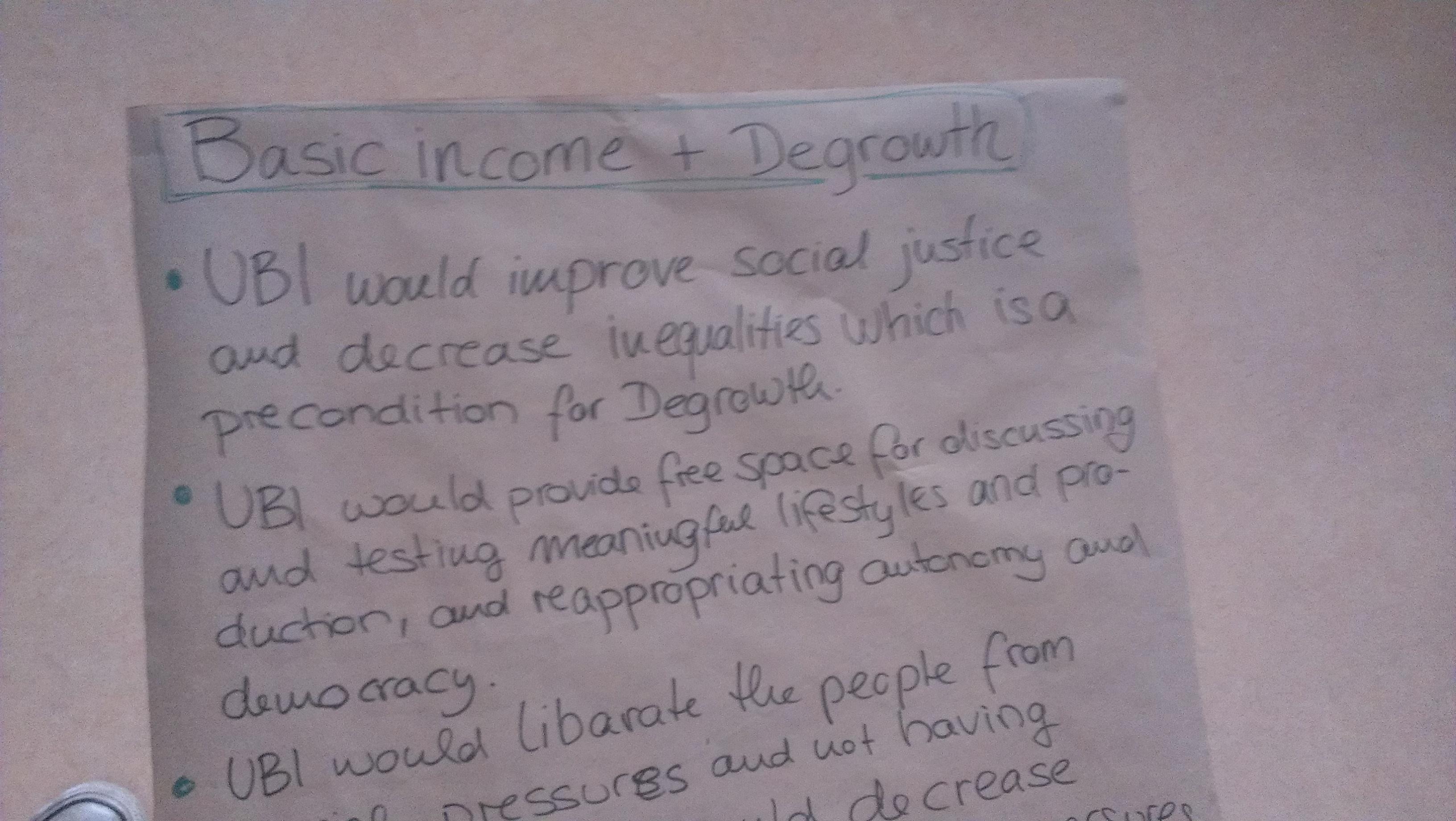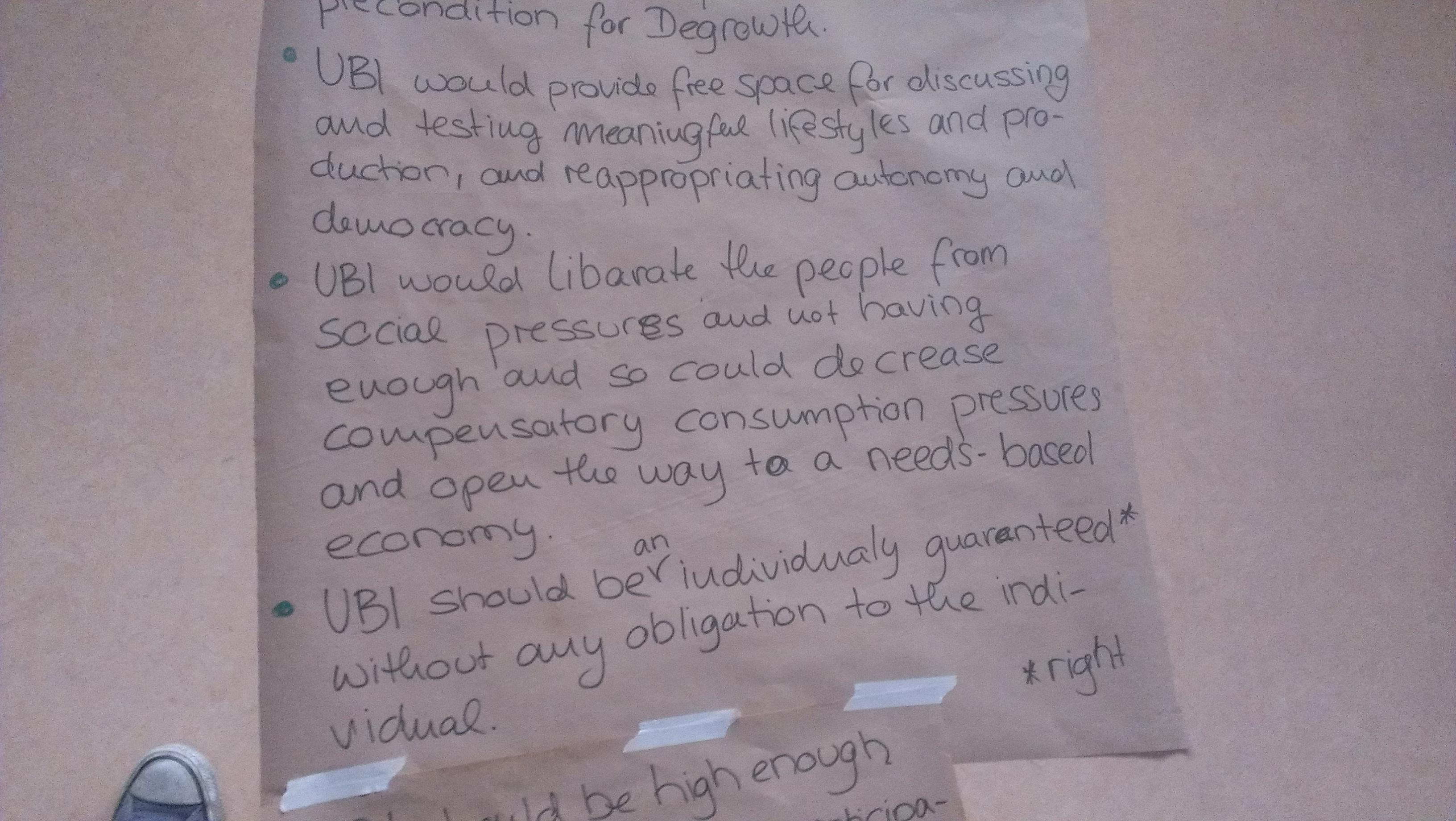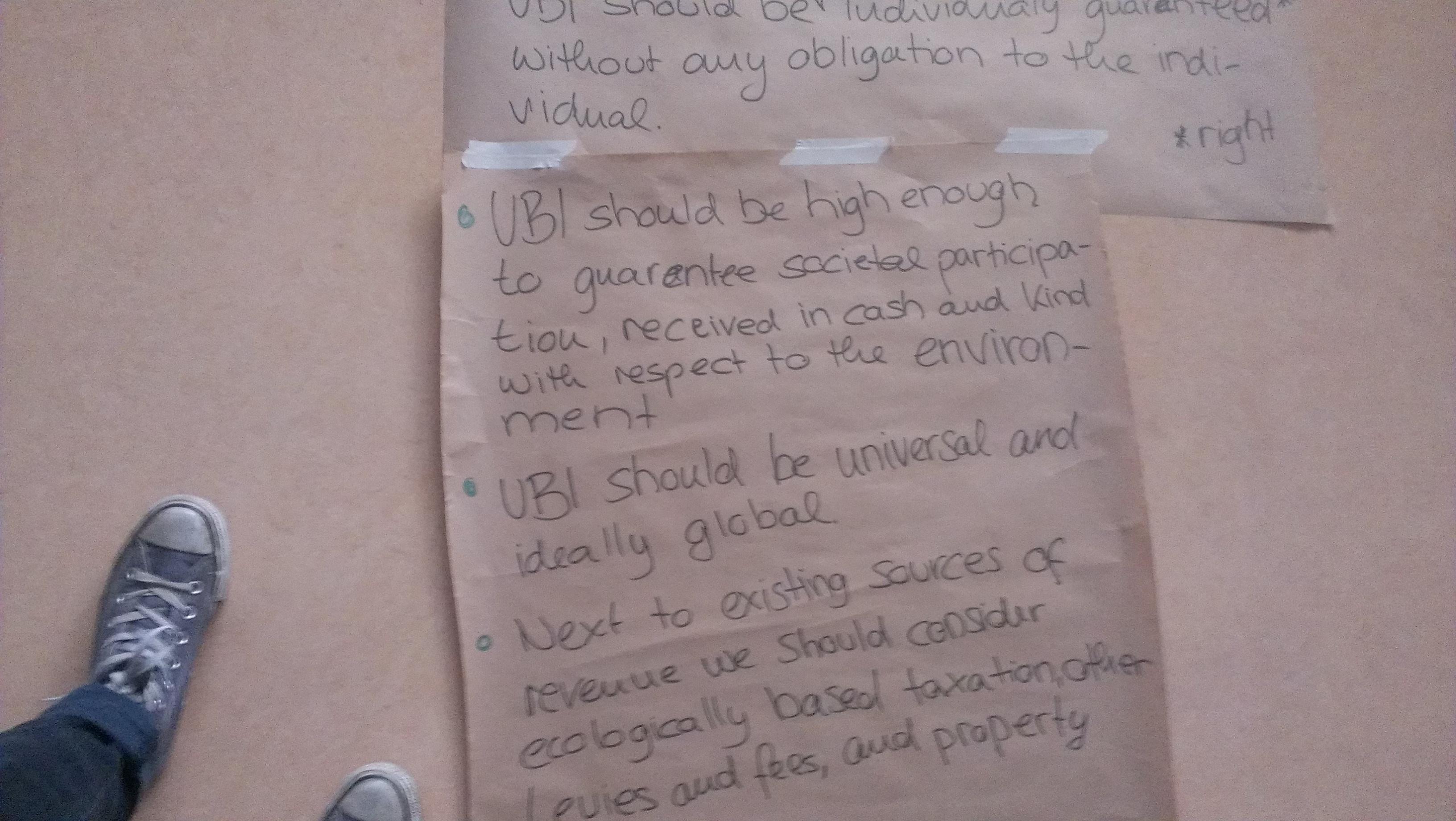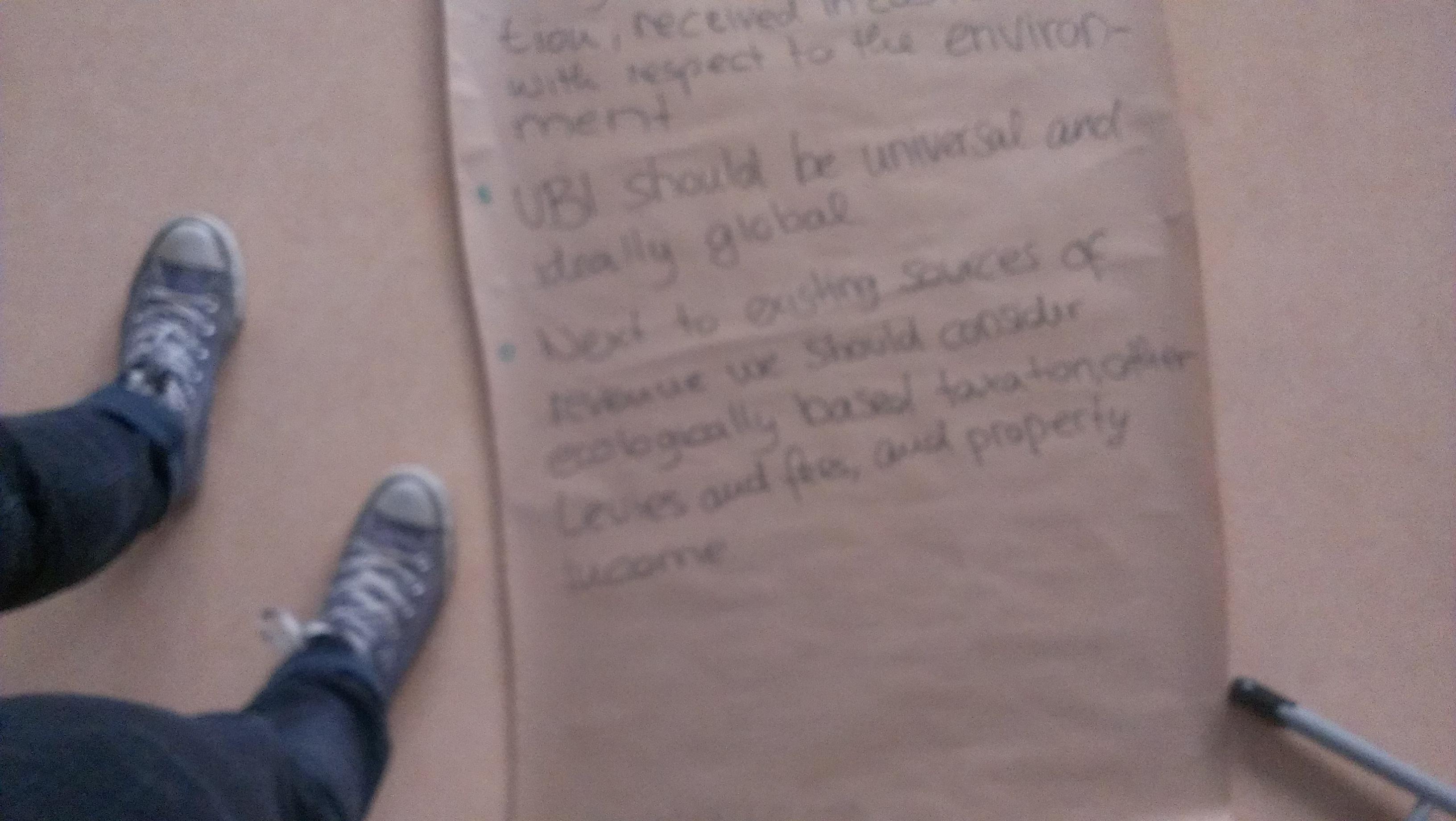The GROWL train-the-trainer (TTT) reader provides an overview of the tools and methodologies for trainers and the functioning of the GROWL network. The attached file is a work-in-progress compiled for a previous course.
A "think-about" for course organisers is also attached.




GROWL INTERNATIONAL COURSE “SOLIDARITY & COOPERATIVE ECONOMY”
1-6 OCTOBER 2014, THESSALONIKI, GREECE
PRACTICAL READER
Dear friends,
We would like to welcome you to the realization of the GROWL international course on “Solidarity and Cooperative Economy”.
This intensive 6 day course is structured in such a way in order to tackle various theoretical, practical and political issues of degrowth and solidarity economy. The course includes the two GROWL core modules (Degrowth lite and TTT- train the trainers) plus a combination of lectures, discussions, workshops and showcases on various aspects of solidarity economy.
The course will be realized in various locations in Thessaloniki, Greece. Following there are some practical information on how to get to Thessaloniki, the different venues and what you need to bring along for your stay and your inputs during the course.
How to get to the hostel:
The Hostel where we will stay on Wednesday and Thursday is named RentRooms and is located in Konstantinou Melenikou 9 (map).
From Thessaloniki Airport please take BUS No.78 towards K.T.E.L. and get off at stop H.A.N.TH. then walk about 10 minutes as indicated by the blue dots in the map you find below.
From the train station please take bus No.10 or No.11 and get off at the bus stop Kamara which is indicated by the red arrow in the map. You will get to the hostel in 5 minutes walk.
You can find info on bus routes here.
On Wednesday, arrival day, we will meet at the hostel the latest at 19.00 where we will have a welcoming session and dinner.
The venue for Thursday is Oikopolis social center (Ptolemaion 29/A, 5th floor) where we will have sessions until 18.00 and lunch. See the map here.
On Thursday at 18.15 we will depart (bus 14) for the Aristotelion University of Thessaloniki (see the map here) where we will have the open public event for the Greek audience.
Dinner on Thursday night will be served at Steki Metanaston which is located in Ermou 23 (see the map here).
Friday morning session will be hosted at PERKA farm (map), where we will also have lunch. We will go there by public transport (bus 38).
Friday afternoon session will be hosted in VIOME reclaimed factory (map) where we will go by bus. After that we will depart by bus and cars for Tagarades farm (map), where we will spend the rest of the seminar.
In Tagarades farm we will stay in shelters (no beds- please bring under-mats). We will be able to have a more self-managed kitchen and we will all help with cleaning our dishes.
On Monday we will depart from Tagarades for Thessaloniki airport by car.
N.B.: please keep in mind that you will need to bring your sleeping mattresses, under-mats, towels and personal hygiene stuff for your stay in Tagarades farm. It might be chilly in Tagarades so please bring warm and comfortable clothes. In case of good weather those wishing to camp with their tents in the beautiful surrounding of the farm are more than welcome to do so.
EMERGENCY NUMBERS:
RentRooms Hostel: +30 2310 204080
Michalis Theodoropoulos: +30 6977 705226, mtheodoropoulos@gmail.com
Pavlina Lazaridou: +30 6945 532778, pavlina.lazaridou@antigone.gr
Domenico Giannoccaro: +30 6972 151479
About the city:
Thessaloniki (Θεσσαλονίκη) is the second-largest city in Greece and the capital of the periphery of Central Macedonia. Furthermore, it is Greece's second major economic, industrial, commercial and political centre and a major transportation hub for the rest of Southeastern Europe; its commercial port is also of great importance for Greece and the Southeastern European hinterland.
This city has a strategically relevant position thanks to its proximity to the Balkan region (Sofia, Skopje and Tirana). Thessaloniki constitutes an important gate from Europe to Middle East as well (Istanbul is distant about 600 km).
Due to its geographic location, Thessaloniki has witnessed a constantly and important flux of migrations. Since the exchanges of population between Greece and Turkey in the early 20th century, to the latest exodus of populations from conflict areas like former Yugoslavia and from some African and Asian countries, the city has been the final or the temporary destination of many people of different nationalities and cultural backgrounds.
It is worth to be mentioned as well, that the presence of the Mediterranean influences the lifestyle of the city.
One of the particularities of the city is its intercultural character. There is a mix of cultures that makes Thessaloniki different from the rest of Greece. It is a city with frenetic life during the day thanks to its markets, crowded squares and seaside terraces, and during the night, with a lot of bars, taverns and music live concerts.
You can feel an atmosphere completely different from the typical capital cities in Europe. Thessaloniki has a modern character, also keeping its Mediterranean roots and ancient origins.
Thessaloniki is also famous for its universities. It hosts Aristotle University, the biggest university of the country and of all the Balkans. The city has one of the biggest student population in Europe indeed!
The city centre is small according to the population. It allows the visitors to walk easily to reach the most important and interesting places. The old town, called Ano Poli, is on the top of the hill of Thessaloniki. From Ano Poli it is possible to enjoy sights of the whole city and to discover the ancient structure of Thessaloniki. This neighborhood has preserved its original architecture. After the big fire of 1917 which destroyed almost all the city except of Ano Poli, in few decades Thessaloniki has changed its face, following the trends of industrialization and modernization.
GROWL INTERNATIONAL COURSE “SOLIDARITY & COOPERATIVE ECONOMY”
1-6 OCTOBER 2014, THESSALONIKI, GREECE
WEDNESDAY 1 OCTOBER
ARRIVAL OF PARTICIPANTS
17.30 - 19.00: bus tour/ bike/ walk in Thessaloniki (participants should choose in advance)
19.00 – 20.30: Welcoming, personal introductions and Team Building Exercises
20.30: dinner at Hostel
THURSDAY 2 OCTOBER at Oikopolis
08.45 – 09.30: Breakfast
09.40 – 09.55: Ice breaker
10.00 – 11.00: Presentation of GROWL (by Gualter Baptista, GROWL coordinator).
11.00 – 12.30: Lecture: A theoretical framework of alternative economic and political spaces with Giorgos Gritzas (Ass. Professor AUTh) and Karolos Kavoulakos (Lecturer AUTh) members of People’s UnivSSE.
12.30 – 13.30: Simulation game on commons and solidarity economy, by Varvarousis Aggelos (PhD cand. ICTA UAB).
13.30 – 15.00: Lunch and presentation of Oikopolis social cente .
15.00 – 16.30: Discussion: Politics, ecology, local institutions and degrowth with Alekos Georgopoulos (Professor AUTh); Lefteris Ioannidis (Mayor of lignite and energy producing Kozani); Christos Adamidis (representative from Skouries movement against the extraction of gold in Chalkidiki).
16.30 – 18.00: Open debate: Growth, austerity and crisis, which way out? Introduced and moderated by Panos Petridis (Researcher SEC Vienna) and Giorgos Kallis (Professor ICTA UAB).
18.30 – 21.00: Public Event (in Greek with translation), “Degrowth and Solidarity Economy” with Giorgos Kallis, Giorgos Gritzas, Panos Petridis, Alekos Georgopoulos, Kostas Nikolaou, Karolos Kavoulakos. At Aristotelion University of Thessaloniki (10th floor, Pegagogical School, 3 Septemvriou St., room "LOGOU & TECHNIS").
21.00: dinner and Welcoming Party at Steki Metanaston (migrant social center).
FRIDAY 3 OCTOBER
08.45 – 09.30: Breakfast
09.30: Departure for PERKA urban farm (in abandoned military camp of Karatasios)
10.00 – 11.30: presentation of PERKA group (on urban farming).
11.30 – 13.00: bus to VIOME
13.00 – 14.30: Presentation and discussion about VIOME (self-managed factory www.viome.org) and light lunch.
14.30 – 15.30: Bus to Tagarades
17.00 - 19.00: Lecture and Discussion: Degrowth fundamentals (lite module) – with Filika Sekulova (Research and Degrowth).
19.00 – 20.00: GROWL Partner meeting
20.00: Dinner / screening of documentary “In transition 2.0” (Transition Network, 2012, 67')
SATURDAY 4 OCTOBER at Tagarades
08.30 – 09.30: Breakfast
09.40 – 09.55: stretching exercises
10.00 – 11.00: Lecture: Dialectical approach and delimitations of the social solidarity economy. Case: the political economy of the water cooperative management, by Kostas Nikolaou (Adj. Professor HOU and member of People's UnivSSE).
11.00 – 12.00: Discussion or Simulation Exercise with Kostas Nikolaou (Adj. Professor HOU and member of People's UnivSSE).
12.00 – 12.15: Break
12.15 – 13.30: Showcase: Producer- consumer networks and cooperatives with Lazaros Aggelou (President of Bios Coop and member of People’s UnivSSE), and Thomas Anemos Papamichos (Agronaftes CSA initiative) and presentation of selected case studies- best practices from participants' countries.
13.30 – 15.00: Lunch
15.00 – 16.30: Workshop: Cooperative economy- from theory to practice - how to set up a cooperative with Dimitris Kitsikopoulos (KAPA network on social economy)
16.30 – 17.20: Lecture: Social solidarity economy: Politics of prefiguration and social transformation, by Alexandros Kioupkiolis (Lecturer AUTh and member of People's UnivSS ).
17.20 – 17.30: Break
17.30 – 18.30: Simulation Exercise by Alexandros Kioupkiolis (Lecturer AUTh and member of People's UnivSSE).
18.30 – 20.00: Showcase: Cooperative working spaces (with representatives from “European Village“ - Akadimia Platona cooperative cafe and “Allos Tropos” social cooperative) and presentation of selected case studies- best practices from participants' countries.
20.30: Dinner / GROWL partner meeting
21.30: Screening of documentary “Another World” (iliosporoi network, 90', 2013)
SUNDAY 5 OCTOBER at Tagarades
08.30 – 09.30: Breakfast
09.40 – 09.55: Stretching exercises
10.00 – 11.45: Showcase: Barter exchange networks, Complementary currencies & Time banks (with representatives from Koino exchange of goods and services network, ARSIS Time Bank and ΤΕΜ Magnisias and presentation of selected case studies- best practices from participants' countries.
11.45 – 12.00: Break
12.00 – 13.30: Showcase: Eco-communities and self-resilient initiatives (with representatives from Free and Real, Spithari, Nea Gouinea ) and presentation of selected case studies- best practices from participants' countries.
13.30 – 15.00: Lunch
15.00 – 17.00: Visioning workshop – what kind of degrowth do we want? Facilitated by iliosporoi network
17.00 – 18.30: TTT module: Training the degrowth trainers (TTT theory, methods and tools (30 minutes presentation of material collected so far in GROWL) and presentation of GROWL future trainer exercises (1 hour).
18.30 – 18.40: Break
18.40 – 20.30: TTT module: Training the degrowth trainers (simulation exercise for all participants – preparing the assignments – Francois Gillet)
20.30: Dinner / screening of documentary “A new we” (Stefan Wolf, 2010, 116').
22.00: Farewell Party
MONDAY 6 OCTOBER
10.00 – 12.00: GROWL partner meeting
DEPARTURE OF PARTICIPANTS
Important Notes:
- Throughout the seminar a dedicated Evaluation- Reflections Board will available for input on highs and lows from the participants, as well as, a board to display ideas for future projects.
- Participant groups are required to present briefly (max 10 minutes), as input during showcases, some case studies- best practices from each country on the specific issues addressed (1. producer- consumer networks and cooperatives; 2. cooperative working spaces; 3. barter exchange networks, complementary currencies and time banks; 4. eco-communities and self-resilient initiatives).
- Speakers are required to send prior to the seminar extended abstracts (1-2 pages in word format) of their presentation (or description of their collective), a Reader (including bibliography, published articles and other useful material) on their subject and a short bio (in word format) of their own. We will collect also the Powerpoints during the seminar and any other material you seem fit. All presentations will be videotaped and all the material gathered will be freely available through GROWL website.
- Participant Trainees (potential GROWL trainers) that in Thessaloniki will attend their second GROWL seminar and wish to present their assignment in order to get certification, please let us know beforehand and prepare a 10-15 minutes presentation of your exercise in order to present it during the TTT module at the end of the seminar. Also please send us before the start of the seminar a brief summary of your assignment.
- 64887 reads